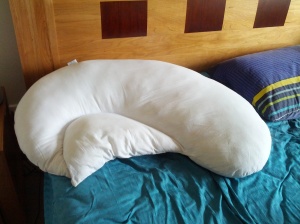
Everyone suffering from a chronic illness would have had someone say to them “if you get enough sleep, you’ll feel better” and I’m sure most of us have also had that unrelenting feeling of not being able to sleep even though you need to.
Today I want to talk about one of the things I find really interferes with my ability to sleep. Before I start, I want to say this isn’t the only thing that interferes, but it is one I think I’ve found a solution to for now.
Problem: Finding pillows that allow you to be comfortable

Photo (c) Megan S, February 2014
I’m sure I’m not the only one that struggles to get comfortable at night, and one of the things that has always annoyed me is my pillow. I have never been able to find one that actually feels comfortable enough for me to get to sleep without tossing and turning.
Just a quick google search for pillows and sleep turns up multiple articles on how to find the best pillows and what are the best positions to sleep in.
Experts on WebMD give the following advice on choosing the correct pillow:
- If you sleep on your back: “Back sleepers need thinner pillows, so their head is not thrown too far forward,” Bernard says. Also look for a pillow with extra loft in the bottom third of the pillow to cradle your neck.
- If you sleep on your side: Side sleepers need a firmer pillow to fill in the distance between the ear and outside shoulder.
- If you’re a stomach sleeper: Look for a very thin, almost flat pillow. You may not even need a pillow for your head, but consider tucking one under your stomach to avoid lower back pain, Breus suggests.
and Health.com shares their top picks for pillows on their site.

Photo (c) Megan S, February 2014
I’ve tried multiple types of pillows; firm and soft, down and foam, but I’ve never found anything comfortable enough. I also struggle to choose based on sleeping position because I don’t stay in one position all night.
My solution for now
After my laparoscopy last year, I was having trouble sleeping on my side because my tummy would hurt where the doctors had gone in. One of my best friends, V, had recently had a baby and one day while we were at their house I needed a rest and used the bed in the baby’s room. The pillow on the bed was one of those pregnancy pillows that supports your tummy, V suggested trying it and it worked well for my post-laparoscopy tummy as well. V lent the pillow to me.

Photo (c) Megan S, February 2014
To begin with I was using the pillow as recommended (to support my tummy) but as that as healed the pillow has migrated upwards and become my main pillow.
I like it because it has varied support levels. If I want a high support I can lie on one of the sides or flip the pillow over, and when lying on my side I tend to use the lower bit which allows room for my arms to wrap around the pillow. I’m not sure why, but I find this pillow much more comfortable than any of my normal ones.
If you’re reading V, thank you for lending me this pillow! It’s definitely helping me get more sleep than I was on any of my pillows.
Have you found a pillow that works well for you?
Do you have any other suggestions for improving sleep with chronic illnesses?
